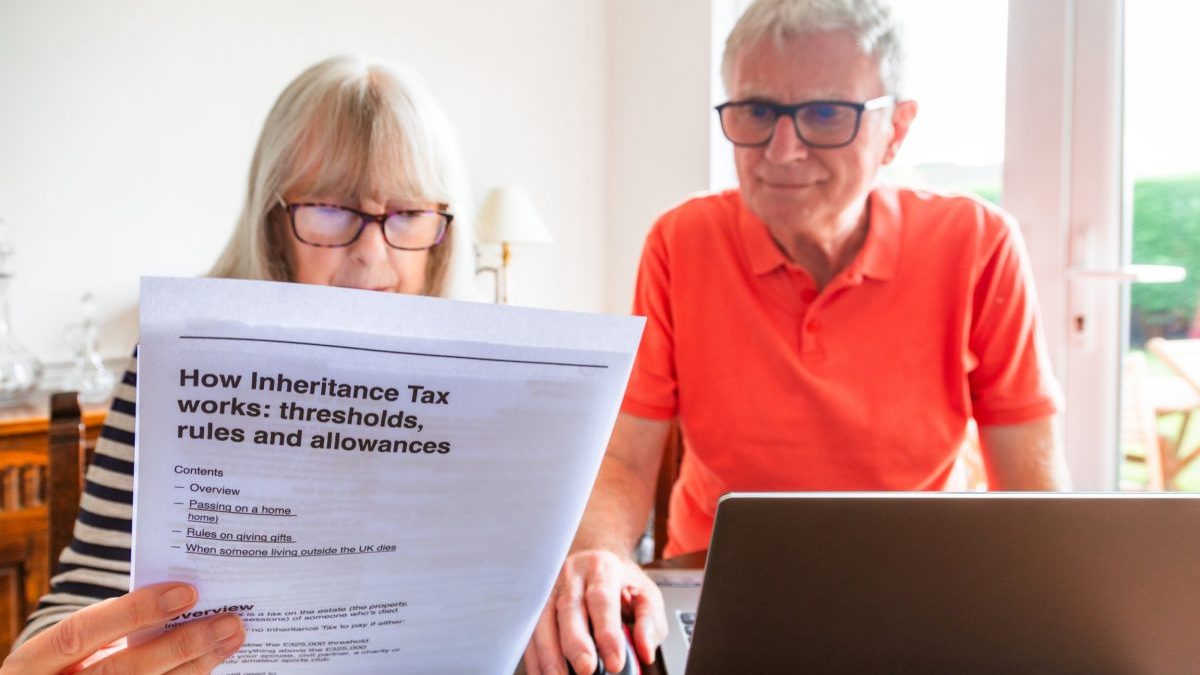There have been rumoured changes to inheritance tax in November. Experts reveal the way you can cut your bill now
There has been a significant rise in inheritance tax (IHT) receipts, reaching £3.7bn between April and August this year.
The continued increase is the result of fiscal drag, with a long-term freeze on the IHT nil-rate bands spanning a period when property and other asset prices have increased.
Speculation is mounting that Rachel Reeves could pursue a crackdown on IHT-related gifting in the Budget on 26 November. Whether or how this will happen remains unknown.
Planning for what happens to your money and other assets once you die is difficult when political and economic policies are continually changing.
However, taking sudden and ill-conceived risks is never a good idea when it comes to IHT planning, even at times of uncertainty, experts warn.
But – if you are looking to limit IHT on your estate once you die – there are steps you can take now.
How does inheritance tax work?
Once you die your estate will be subject to IHT if it exceeds the individual nil-rate band, which is currently £325,000.
HMRC does not wait long when it comes to sending out its IHT demands to relatives. The IHT will have to be paid by the end of the sixth month after you die.
To figure out how much IHT will be payable, as a general rule you can count up the value of all the assets you have, subtract the nil-rate band and the residential nil-rate band (RNRB) if applicable, and whatever is left over will be taxed at up to 40 per cent and paid for by your estate.
The RNRB increases the threshold to a joint £1m if you have a partner, own a property, and intend to leave money to your direct descendants.
But once an estate reaches £2m, this home allowance starts being reduced by £1 for every £2 above this threshold, and is defunct by £2.3m.
Steps to limit inheritance tax
1. Start early and stay flexible
Take a proactive approach to IHT planning and start thinking about it as early as possible. Do not assume your plans for IHT will stay the same over time. If policies or rules change, make sure your plan is up-to-date.
Christopher Hallam, head of financial planning at First Wealth, said: “The sooner you start IHT planning, the more options you have. You can spread gifts across tax years, make use of exemptions, and – crucially – start the seven-year clock ticking on larger transfers.
“Estates are creeping into the taxable zone without families realising. Early action can mean the difference between a smooth transition and an unexpected bill.”
Always consider getting professional financial advice before making any decisions about your IHT planning.
2. Charitable and political party donations
Money bequeathed or gifting to a charity or political party will be excluded from your estate when IHT is calculated.
If you leave at least 10 per cent of your net estate, namely the portion liable for IHT, to a charity in your will, the IHT rate on this portion will be reduced from 40 per cent to 36 per cent.
Laura Walkley, a partner and head of private client at TWM Solicitors, said: “Donors gave close to a billion pounds to charity in their wills last year – a sign that gifting is increasingly being used as a smart estate-planning tool.”
If gifting or bequeathing money to a political party, note that to qualify for the exemption, the political party must have, as of the last general election, either at least two MPs in the House of Commons, or one MP and received at least 150,000 votes.
 Always seek advice about your tax affairs if you are unsure (Image: Getty)
Always seek advice about your tax affairs if you are unsure (Image: Getty)
3. Gifts between spouses and civil partners
There is no IHT to pay on gifts between spouses or civil partners. You can gift them as much money as you like during your lifetime, so long as your spouse or civil partner lives in the UK permanently and are legally married or in a civil partnership with you.
4. Gifting surplus income
Aside from gifting money to your spouse or civil partner, rules permit further gifting to others which can help reduce IHT payable on your estate when you die.
Every tax year you can give away some money or possessions free of IHT. How much is tax-free depends on which allowances you use.
Mr Hallam said: “If regular gifts don’t reduce your standard of living, fall within your income, and are properly recorded, they’re immediately outside your estate – there’s no seven-year rule with gifts such as these. This is a huge win, but HMRC will want clear evidence, so keeping records is essential.
“Do note that this is a complex area and care needs to be taken around what qualifies as income. Careful planning can help you structure your finances to generate a consistent surplus – and build gifting into your income strategy.”
5. Learn about the seven-year rule
Larger one-off gifts are known as Potentially Exempt Transfers.
Hallam said: “If you live for seven years after making the larger monetary gift, it will be out of your estate for IHT. Die sooner, and some or all of the gift may still be taxable. Be aware that if you keep benefiting from the asset by, for example, living in a property you have gifted, the gift does not count.”
If, for example, you inherit £200,000 from a distant relative and want to give £100,000 each to your two children, you can do this. If you die seven years or more after you gave them each £100,000, the gifts will not form part of your estate for IHT purposes. If you die earlier, the gifts will be subject to some IHT.
Hallam added: “For larger gifts, life insurance can offer a back-up plan, giving people confidence a plan would be immediately effective if required.”
6. Use the annual gift allowance
You can gift £3,000 per year, and make small gifts of £250, free from IHT.
According to reports, dropping the £3,000 cap is among the measures being considered by Reeves as she tries to plug a gap in the nation’s finances.
7. Utilise wedding gifts
Wedding gifts can help limit the size of your estate for IHT purposes.
To qualify for the exemption, the gift must be made before the wedding and not after the wedding. The wedding must go ahead for the exemption to be eligible.
The sum you can give depends on your relationship to the person receiving the gift.
You can gift up to £5,000 for any children getting married, £2,500 to a grandchild or great-grandchild getting married or £1,000 for anyone else.
8. Consider trusts – but approach with caution
Hallam told The i Paper that he was often asked by clients whether they can put money or other assets in a trust to “avoid” IHT.
He said: “In reality, it’s rarely that straightforward and probably highlights the lack of understanding in what is a complex area.
“While trusts can play a useful role in estate planning, they come with important considerations.
“An upfront tax may apply. Larger transfers into trust may be subject to an immediate 20 per cent IHT charge if they exceed the available nil-rate band.
“Ongoing charges may also apply. Trusts may face periodic charges every 10 years, as well as exit charges and higher rates of income and capital gains than individuals.
“Access may be another issue. Once assets are placed in trust, they’re typically no longer accessible to the person who made the gift, which may not suit everyone.”
He added: “Trusts require legal setup, administration, tax reporting and sometimes professional trustees, which can add cost and reduce flexibility. Used in the right way, trusts can offer control and protection. But they are not a shortcut and are rarely the first or only option when it comes to IHT.”
9. Look out for business relief
At present, the Government offers protections when trading businesses are left to family members.
For the time being, to qualify for business property relief, you need to have owned a firm or shares in it for at least two years by the time you die.
From April 2026, the availability of 100 per cent relief for agricultural and business property would be capped.
Assets eligible for 100 per cent APR and assets eligible for 100 per cent BPR would qualify for full relief up to a sum of £1m. 50 per cent relief would apply thereafter.
Hallam said: “Business relief is one of the most powerful tools in estate planning, offering up to 100 per cent relief from IHT on qualifying investments after just two years. Unlike gifting, you retain access to the capital. With business relief, you can also reduce your taxable estate without committing to a full transfer.
“Taking an example, £500,000 in qualifying business relief investments could save you £200 in IHT in just two years.”
Change in this area is on the way soon. Limits are coming in and the treatment of different types of investments vary. These investments also carry risk, so may not be suitable for everyone.
10. Don’t pin your plans on any Budget
Determining how you will deal with IHT has to be viewed as part of a long-term financial plan. It is impossible to predict with certainty what, if any, policy changes will be introduced, altered or scrapped.
Hallam said: “Reform is coming. But the best defence is a well-thought out, regularly-reviewed plan. This includes keeping wills and powers of attorney up-to-date, reviewing business structures, aligning and reviewing insurance policies on the basis of the size of your estate, and ensuring assets will pass efficiently and in line with your wishes.”
He added: “Above all, planning for what happens to your assets when you die is about your beneficiaries. You want to make sure your wealth helps the people you care about when they need it most.”

